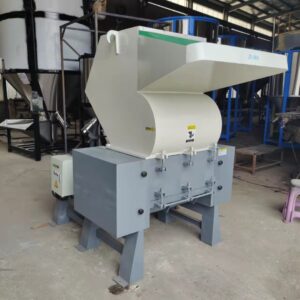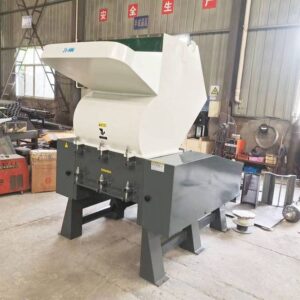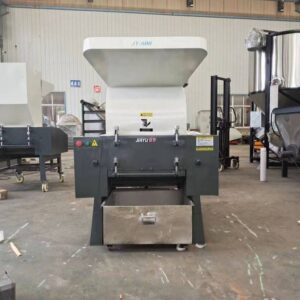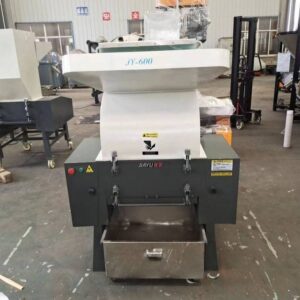In today’s fast-evolving industrial landscape, the problem of plastic waste continues to loom large. From packaging materials to disposable goods, plastics have permeated nearly every aspect of our lives—and so has the need for efficient plastic recycling. One key solution that has emerged in the fight against plastic waste is the plastic crusher machine. Compact, powerful, and essential for plastic reprocessing, plastic crushers have become an indispensable tool across numerous industries.
In this article, we will explore what a plastic crusher is, how it works, its types and applications, and why investing in the right plastic crusher can revolutionize your recycling or manufacturing operations.
What is a Plastic Crusher?




A plastic crusher—also referred to as a plastic granulator or plastic grinder—is a mechanical device designed to break down plastic materials into smaller, more manageable granules or flakes. These crushed plastics can then be reused in various manufacturing processes or further processed into pellets for extrusion, injection molding, or other applications.
The crusher consists of a solid housing, a rotating cutting mechanism (usually with blades or knives), a screen mesh to control output size, and a motor system that drives the rotor. It can process a wide variety of plastic materials such as:
-
PET bottles
-
HDPE containers
-
PP films and woven bags
-
ABS shells
-
PVC pipes
-
PE drums and more
How Does a Plastic Crusher Work?
The working principle of a plastic crusher is relatively straightforward:
-
Feeding: Plastic waste is fed into the machine via a hopper.
-
Cutting: Inside the crushing chamber, high-speed rotating blades interact with fixed blades to shear and crush the plastic material.
-
Screening: Crushed material is filtered through a mesh or screen to ensure consistent size.
-
Discharging: Processed granules or flakes exit from the bottom of the machine and can be collected for reuse or storage.
Depending on the machine model and material type, the output size can range from a few millimeters to several centimeters. This size flexibility allows customization for different recycling goals.
Key Features of Modern Plastic Crushers
Modern plastic crushers are designed with efficiency, safety, and durability in mind. Here are some essential features to consider:
1. Robust Blade Design
-
Made from hardened steel or alloy for longevity.
-
Configurable as V-shaped, claw-shaped, or flat blades depending on material type.
2. Motor Power & Capacity
-
Ranges from 5HP to 150HP+ depending on workload.
-
Higher torque for thick materials like hard plastics or large containers.
3. Screen Mesh Size
-
Determines the size of the final crushed product.
-
Easily replaceable for flexibility in production needs.
4. Safety Systems
-
Emergency stop buttons, protective covers, and interlocking systems ensure operator safety.
5. Soundproofing and Dust Control
-
Some models include acoustic insulation to reduce noise.
-
Dust collectors or sealed housings help minimize airborne particles.
Types of Plastic Crushers
Plastic crushers come in various types depending on their design and application. Here are the most common categories:
🌀 Standard Plastic Crusher
Ideal for general-purpose crushing of soft to medium-hard plastic materials. Widely used in small to medium recycling plants.
🧱 Heavy-Duty Plastic Crusher
Built for large plastic items like pallets, thick pipes, and large drums. These crushers often feature larger chambers and reinforced blades.
🧶 Film Crusher
Specifically designed for crushing plastic films, PP woven bags, agricultural film, and thin plastic sheets. Uses specially angled blades to avoid wrapping and clogging.
🛢 Pipe Crusher
Equipped with a wide feeding inlet and specialized shaft to handle long or thick-walled plastic pipes.
Applications of Plastic Crushers
Plastic crushers are not limited to recycling plants alone—they are found in many industries including:
♻️ Recycling Industry
-
Pre-processing step before plastic pelletizing.
-
Enables regrind of defective or rejected plastic parts.
🏭 Manufacturing Industry
-
Reusing scrap or runner parts from injection molding or extrusion.
-
Reducing material waste and cost.
🧴 Packaging Industry
-
Processing leftover plastic rolls, bottles, and caps.
👷 Construction and Agriculture
-
Crushing used tarps, construction film, PVC sheets, or agricultural plastic for easier disposal or recycling.
Advantages of Using a Plastic Crusher
✅ 1. Cost Savings
Recycling and reusing crushed plastic can significantly reduce raw material costs.
✅ 2. Environmental Responsibility
Promotes sustainability by minimizing plastic waste and promoting circular economy practices.
✅ 3. Improved Production Efficiency
Reprocessed plastic can be fed back into production lines, reducing material delays.
✅ 4. Volume Reduction
Significantly decreases the space needed to store waste plastics—crushed plastic is easier to transport and manage.
✅ 5. Customizable Output
Operators can select output size by changing screens and blade configurations.
How to Choose the Right Plastic Crusher
Choosing the right plastic crusher depends on several key factors:
| Factor | Consideration |
|---|---|
| Material Type | Is it soft film, hard pipe, bottle, or mixed plastic? |
| Output Size Needed | Finer granules or coarse flakes? |
| Daily Throughput | Small workshop or large-scale facility? |
| Power Supply | Ensure compatibility with your electrical setup (380V/220V etc.). |
| Noise & Dust Control | Consider models with built-in soundproofing and dust filtration. |
Always choose machines with quality certifications (CE, ISO9001) and from manufacturers with solid after-sales support and spare part availability.
Maintenance Tips for Longevity
To keep your plastic crusher operating efficiently:
-
Regularly sharpen or replace blades.
-
Clean screen mesh and discharge area to prevent clogging.
-
Lubricate moving parts to reduce friction.
-
Inspect motor and belts for signs of wear.
-
Empty dust collection systems frequently.
Final Thoughts
A plastic crusher may seem like a simple piece of equipment, but in reality, it is a vital component in the plastic recycling and manufacturing ecosystem. Whether you’re running a small workshop or a full-scale recycling plant, a quality plastic crusher can help you reduce costs, improve efficiency, and take an active role in reducing environmental pollution.
At a time when sustainability and waste reduction are more important than ever, investing in the right crushing equipment is not just good business—it’s a step toward a cleaner future.
Looking for a reliable plastic crusher?
Contact our team for professional advice, machine recommendations, or a custom solution tailored to your recycling needs.
Let me know if you want a specific version tailored to a particular machine model, brand (e.g. AULTRAL), or region, or if you want to publish this on your website with SEO keywords.
